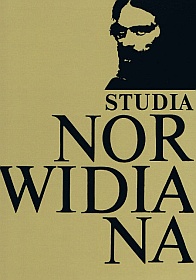„I didn’t know you – Jews”. The Jewish Uprising and the Figure of Bar-Kokhba in Cyprian Norwid’s Quidam (transl. by Tadeusz Karłowicz)
Abstract
The action of Quidam is set in Hadrian's Rome. Public and private hysteria rises due to the Jewish war 132-135 p. Chr., but also to a conflict between Hadrian's religion policy and its Greek, Jewish and Christian opponents. The Jewish uprising is confronted to Greek non opposition and to the Christian way of opposition by public faithwitnesses. It is raised to the role of a `motor' in a ruined epic machine, and hints to modern Polish (or other nations') uprisings. Barchob (Bar-Kokhba?) is shown as a Roman Jew's disciple, secret admirer of Christian courage, friend of Alexander, the poem's main person; as a messianic fighter in Judea; and finally as an advocate of interreligious solidarity. Quidam is a „przy-powieść”, a „para-novel” with a ruined narrative time and action structure, and a „parable” which answers strangely to Chateaubriand's demand for Christianity epics, forming an allegory also of modern civilisation, police state, public opinion, modern conflictual cultural and religious pluralism, modern individualism, scepticism and altruism.
Copyright (c) 2008 Studia Norwidiana

This work is licensed under a Creative Commons Attribution-NonCommercial-NoDerivatives 4.0 International License.





